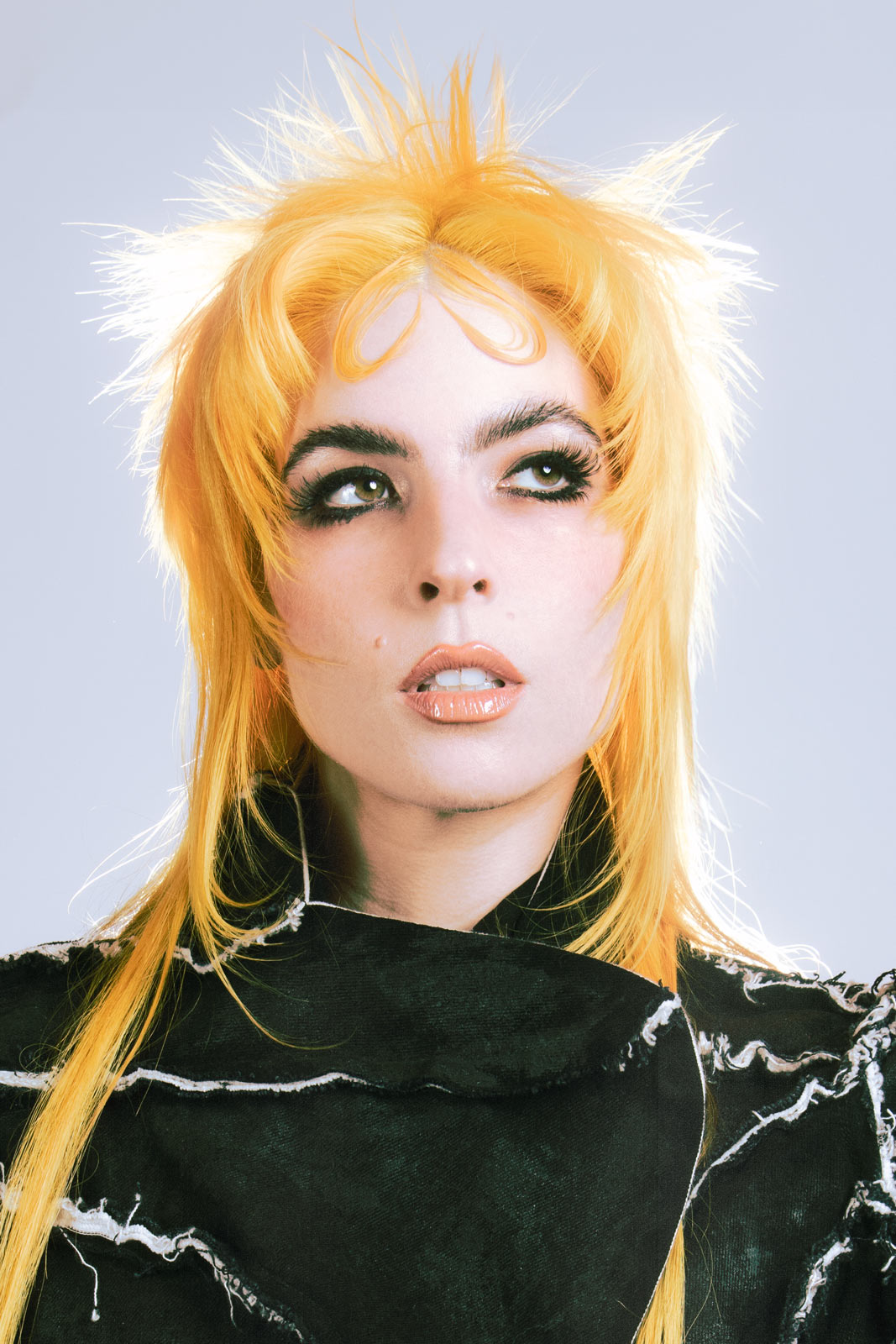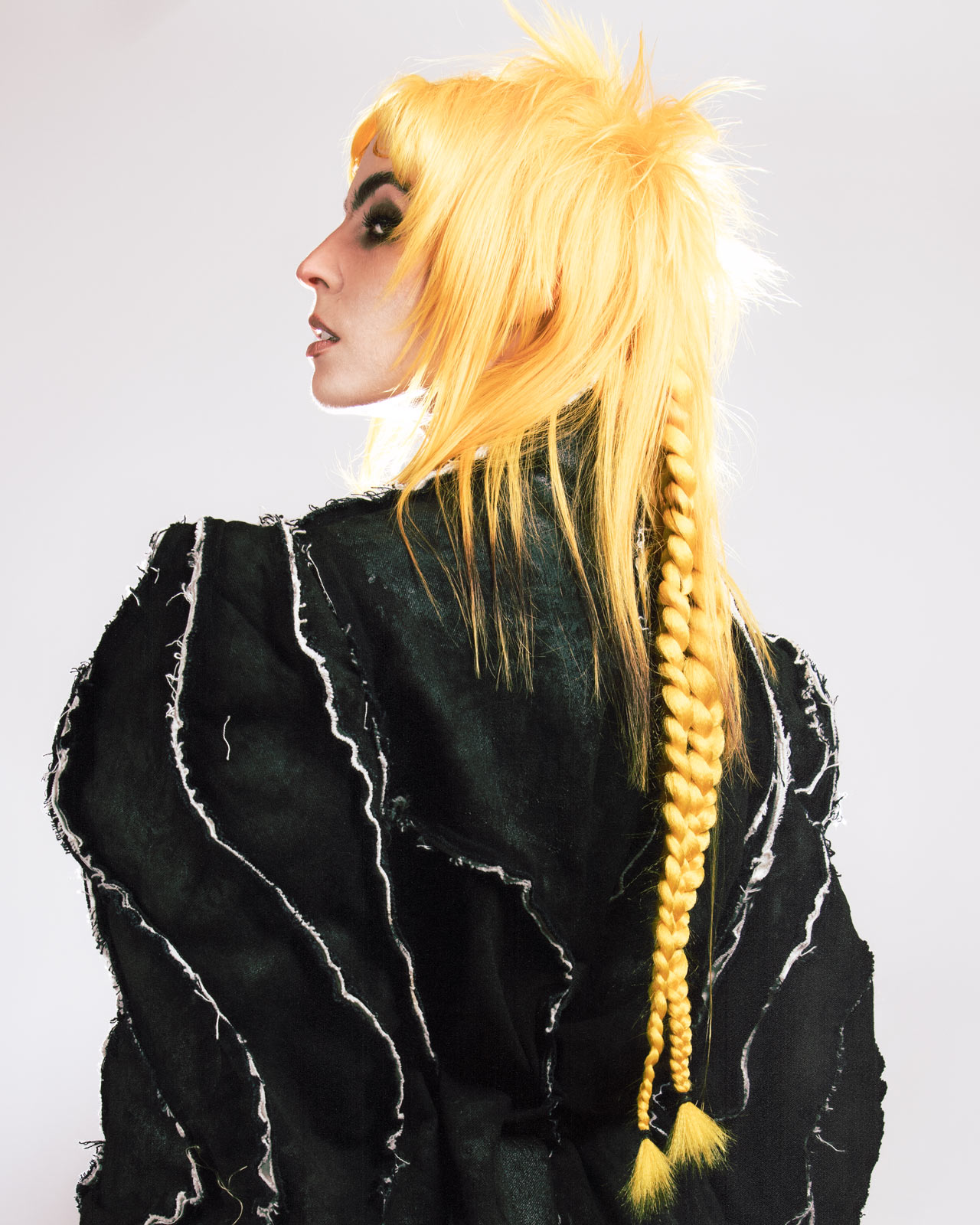Upon the release of their third album, the rising star speaks on theater kids, rock-opera, and the questionable influence of stan Twitter
Dorian Electra has got their hands in many different pots: They’re a talented musician, a pop culture rabble-rouser, and a breakout runway star—even dabbling in the dark art of trend forecasting. “Honestly, all the theater kids are about to come out of the closet, for better or worse. We’re about to have our fucking Les Mis moment,” they say, conjuring up images of an epic series of highly-stylized vocal rounds à la “One Day More,” flags and bayonettes included.
Electra’s Fanfare, similarly, is a bassy, operatic project that feels like wielding a very large sword. It combines the artist’s hyperpop heritage with traces of jazz, classical, and metal, while referencing a salient question surrounding social media demagoguery: What does it mean to be a fan?
From their “vibes whiteboard”—a physical document containing ideas like drum and bass, but with only marching band drums, and vague mentions of Bruce Springsteen—to their high-octane music videos, it seems that Electra is no different from the theater kids they coax out of the closet. More than their music provokes scintillating conversation, it encourages unfiltered, out-and-proud nerdiness.
Maya Kotomori: Tell me about the parasocial elements of Fanfare—where does that come from?
Dorian Electra: I’ve always tried to make work that responds to the world around me. Being a fan of different bands on the internet was such a big part of my teenage experience. Fandom at large is so influential—look at K-pop stans or Barbz on Twitter.
There’s this idea that Twitter gave power to the people, like we saw with the Arab Spring. People use the term democratization a lot to describe these platforms, but it’s not necessarily true. [Fanfare] is more interested in the general tendencies on an app like Twitter, where people feel like, if you don’t say something about everything, your ‘silence is deafening.’ There’s a social pressure that fans put on celebrities in a way that doesn’t feel productive. I try to use the medium of pop music to challenge people, to get them to think a little bit more about this relationship.
“I’ve come to fully embrace the things that I thought were uncool—the rock-opera vibes. I’m old enough to look back at my past and not cringe that much.”
Maya: With the song ‘Sodom & Gomorrah,’ how did you think to connect this biblical story to parasociality?
Dorian: People often use the story of Sodom and Gomorrah—a city so sinful that God came down and destroyed it—to talk about homosexuality as evil. That’s where we get the word sodomy from. I thought it would be really fun to take that and reclaim it. In the music video, I have a shop selling Sodom and Gomorrah souvenirs, and there are these tourists taking photos; that’s how everything exists in our world now—tragedy merch and photos. You can buy 9/11 Memorial merchandise, you can go to Chernobyl and buy radioactive shot glasses. It’s scary and horrifying, but there’s so much entertainment value in that. That’s the main [point] of the song.
Maya: What do you think the lyrics on Fanfare contribute to the larger social conversation you reference?
Dorian: I really wanted to [not only] examine fandom, but to also ask people, What do we expect? If you look at recent stuff with Doja Cat, Britney Spears, even the Paris Hilton documentary—fandom is not something that is just in the realm of traditional celebrity anymore. It’s the new religion in a lot of ways. People are hungry for a connection to something higher than themselves. I’m not saying that’s good or bad, but I think it’s time to take a look at what’s going on in our society, to see how things are functioning in a critical but open-minded way.
Maya: What is your relationship to object and concept, and how does it influence your process? Like, do you consider things like the ‘Sodom & Gomorrah’ gift shop first, or the song’s lyrics?
Dorian: It’s definitely a mix of both. In the past, I’ve been very visually-driven; I would always see the music video as I was making a song. With ‘Man To Man,’ I knew the video had to be red and blue, with this ’80s, almost Michael Jackson vibe, [but also] mixed with medieval. Sometimes, I would get so caught up in the concept that I would decide, This has to be a single, before even listening to it. This time, I really wanted to challenge myself to think about my music first.
Maya: How did challenging yourself in that way affect the process of the album?
Dorian: This album was definitely a lot harder to make, because I didn’t have a thesis from the outset—I let it emerge organically. I [ended up] with a lot of rock opera [influences], I think because I grew up on classic rock and musical theater—Les Mis is my favorite. I just love music that is epic, and over the top. For ‘Yes Man,’ I was imagining a Ronald McDonald-Napoleon [character who] went to war against his better judgment. He’s pushed everyone away because of his own ego, and now he’s all alone on the battlefield. Casey MQ played these beautiful chords and told me, ‘Why don’t you just get on the mic? We’ll see what happens.’ I never freestyle stuff but it all started coming out of me.
The only other song on the album that I kind of freestyled on was ‘Warning Signs’—I didn’t have the lyrics ahead of time, just the [phrase] warning signs. Those two songs feel the most personal to me, because when you’re improvising like that, you’re tapping into some subconscious stuff.
Maya: Do you have any interest in writing a musical?
Dorian: I feel like that’s definitely something on the horizon for me. Even acting in an existing Broadway show would be really fun. There’s just something about theater, because it brings a story to life that is bigger than just the music. That’s how I’ve always viewed my work. I have ADHD, so I try to make things that I’m not bored by.
I do the set design for my own music videos. My favorite part of that process is getting creative with the logistics, like how to do something on a budget. A lot of people say things like, ‘You must be an industry plant, because your videos look amazing.’ I’m like, ‘No, it’s because I’ve been making videos since I was 14, doing stuff with friends and figuring out tricks to make things look expensive.’
Maya: What kind of stuff would you make?
Dorian: A lot of them were school projects. Like, I would do a book report for Brave New World and make a parody of another song, or write my own and edit it in iMovie. I love storytelling, and also taking a historical thing and making it new.
Maya: You’ve come full circle. What’s one thing music has taught you through all of this?
Dorian: I’ve always been a nerd. The music I started making was about economics, philosophy, and history. I’ve come to fully embrace the things that I thought were uncool—the rock-opera vibes. I’m old enough to look back at my past and not cringe that much. I can appreciate what really feels authentic to myself.
Styling by Luca Wowczyna.























